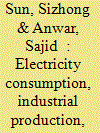|
|
|
Sort Order |
|
|
|
Items / Page
|
|
|
|
|
|
|
| Srl | Item |
| 1 |
ID:
178818


|
|
|
|
|
| Summary/Abstract |
Market efficiency is distorted when retailers are unwilling to pass on changes in wholesale costs or the price of oil (as a major production input cost) to motorists. Existing approaches to measuring pass-through parameters may obscure such behaviour because of the use of fixed-parameter models and/or aggregated price data across different locations and brands over time. We contribute to the literature by examining if there is a mismatch between wholesale and retail petrol prices across different brands supplying unleaded petrol within the same geographical location. To do so, we examine the effects of upstream shocks, arising from changes in oil or wholesale petrol prices, on the retail petrol prices of 672 stations in Sydney, Australia's largest city. We find that the pass-through parameters are significantly lower for stations with fewer competitors in their immediate proximity. When there are fewer than 13 petrol stations within a 5-km radius, or 33 stations within 10 km, irrespective of their brand, they become increasingly less responsive to changes in the wholesale petrol price or the price of crude oil. Our findings enhance market transparency and provide regulators with a rule of thumb that allows them to monitor the unleaded petrol market more effectively.
|
|
|
|
|
|
|
|
|
|
|
|
|
|
|
|
| 2 |
ID:
092971


|
|
|
|
|
| Publication |
2009.
|
| Summary/Abstract |
This paper investigates the relationship between regional and national identities in the age of globalisation, with particular reference to the Association of Southeast Asian Nations (ASEAN). For members of ASEAN, economic integration is seen as a necessary step forward in order to (i) reduce reliance on Western countries during times of economic crisis and (ii) speed up the recovery process in the aftermath of a crisis. The concept of an ASEAN Economic Community represents a step towards achieving this goal. However, by means of a case study, this paper demonstrates that the idea of an ASEAN Economic Community does not yet have sufficiently solid foundations. Cracks appear when member states act in response to national interest. Given the frequency of friction between member nations, and the fact that ASEAN members are quite diverse in both economic and cultural respects, there is still much more to be done to realise the objective of forming an effective and credible regional economic group. In this paper some suggestions are offered that might assist with the achievement of this goal.
|
|
|
|
|
|
|
|
|
|
|
|
|
|
|
|
| 3 |
ID:
137704


|
|
|
|
|
| Summary/Abstract |
Within the context of a tri-variate vector autoregressive framework that includes entrepreneurship, this paper examines the link between electricity consumption and industrial production in Singapore's manufacturing sector. Unlike the existing studies, this paper focuses on one sector of the economy and utilises a unique monthly dataset. Empirical analysis based on Johansen's cointegration approach shows that the three variables are cointegrated – i.e., a stable long-run relationship exists among electricity consumption, output and entrepreneurship in Singapore's manufacturing sector. Empirical analysis based on data from January 1983 to February 2014 reveals that electricity consumption adjusts very slowly to shocks to industrial production and entrepreneurship. Furthermore, entrepreneurship Granger causes electricity consumption, which causes industrial production. As electricity consumption causes industrial output, the growth hypothesis concerning energy consumption and economic growth holds in Singapore's manufacturing sector and policies that restrict electricity production, without electricity imports, are likely to lead to a decline in the manufacturing output.
|
|
|
|
|
|
|
|
|
|
|
|
|
|
|
|
|
|
|
|
|